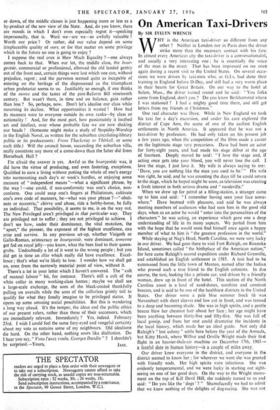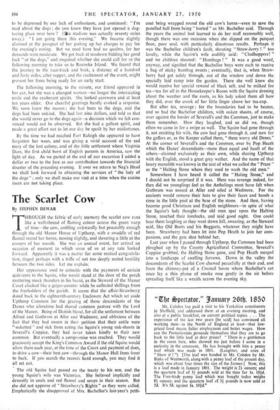On American Taxi-Drivers
By SIR EVELYN WRENCH
HY is the American taxi-driver so different from any other ? Neither in London nor in Paris does the driver strike more than the necessary contact with his fare. In almost every American city the/taxi-driver is a conversationalist, and usually a very interesting one ; he is essentially the voice of the man in the street. That has been impressed on me once again during a recent visit to the United States. On several occa- sions we were driven by taxi-men who, as G.I.s, had done their training in England before D-Day, and still had a very warm place in their hearts for Great Britain. On our way to the hotel at Salem, Mass., the driver turned round and he said : "You folks come from England, don't you ? Do you know Berkhamsted where I was stationed ? I had a mighty good time there, and still get letters from my friends at Christmas."
One real character was Dave. While in New England we took his taxi for a day's excursion, and under his care explored the district of Cape Ann, the scene of one of the earliest English settlements in North America. It appeared that he was not a taxi-driver by profession. He had only taken on his present job a few years ago, when the competition of the films made a career on the legitimate stage very precarious. Dave had been an actor for forty-eight years, and had made his stage debut at the age of fourteen. Deeply moved he said: "I love the stage and, if acting once gets into your blood, you will never lose the call. I love the stage, I just love it. My wife is always saying to me: 'Dave, you are nothing like the man you used to be.'" His wife was right, he said, and he was counting the days till he could return to the stage, which he hoped might be soon, as television was creating a fresh interest in both serious drama and "vaudeville."
When we drew up for petrol at a filling-station, a stranger came up to him and said: "I remember having seen your face some- where." Dave beamed with pleasure, and said he was always meeting members of audiences who had seen him in the good old days, when as an actor he would "enter into the personalities of the characters" he was acting, an experience which gave one a deep understanding of life in its many aspects. We parted from him with the hope that he would soon find himself once again a happy member of what to him is "the greatest profession in the world."
While staying at Nag's Head, North Carolina, we were very lucky in our driver. We had gone there to visit Fort Raleigh, on Roanoke Island, sometimes called "the birthplace of the American nation," for here came Raleigh's second expedition under Richard Grenville, and established an English settlement in 1585. A taxi had to be summoned from the little town of Manteo, named after the Indian who proved such a true friend to the English colonists. In due course, the taxi, looking like a private car, and driven by a friendly woman, drew up in front of the hotel. This section of the North Carolina coast is a land of sand-dunes, sunshine and constant breezes, and is said to be one of the healthiest districts in the United States. Our driver wore a pale blue summer frock (it was November) with short sleeves and low cut in front, and was tanned to a deep and becoming shade. She was in high spirits, and a gentle breeze blew her chestnut hair about her face ; her age might have been anything between thirty-five and fifty-five. She was full of local gossip, and from her seat could dramatise the incidents in the local history, which made her an ideal guide. Not only did Raleigh's "lost colony" settle here before the year of the Armada, but Kitty Hawk, where Wilbur and Orville Wright made their first flight in an heavier-thgn-air machine on December 17th, 1903- a fateful date in human history—is a couple of miles away.
Our driver knew everyone in the district, and everyone in the district seemed to know her ; for wherever we went, she was greeted with friendly nods. Her high spirits were infectious. She was evidently temperamental, and we were lucky in starting out sight- seeing on one of her good days. On the way to the Wright monu- ment on the top of Kill Devil Hill, she suddenly turned to us and said: "Do you like the dogs ' ? " Shamefacedly we had to admit that we knew nothing of the delights of dog-racing. She was not to be depressed by our lack of enthusiasm, and continued: "I'm mad about the dogs ; do you know they have just opened a dog- racing place near here ? (The stadium was actually seventy miles away.) "I am going there this evening." We became slightly alarmed at the prospect of her putting up her charges to pay for the evening's outing. But we need have had no qualms, for her demands were moderate. We got back at sundown bidding her good luck "at the dogs," and enquired whether she could call for us the following morning to take us to Roanoke Island. We feared that the journey to the race-track and back, a distance of a hundred and forty miles, after supper, and the excitement of the event, might prevent her from being ready for an early start.
The following morning, to the minute, our friend appeared in her car, but she was a changed woman—no longer the intoxicating smile and the exuberant spirits. She looked careworn and at least ten years older. Our cheerful greetings hardly evoked a response. We soon knew the reason ; she had been to the dogs, and the dogs had been unkind. She had lost nine dollars, and told us that she would never go to the dogs again—a decision which we felt con- vinced would not be observed. But she had a gallant spirit, and made a great effort not to let our day be spoilt by her misfortunes.
By the time we had reached Fort' Raleigh she appeared to have forgotten her woes, and was giving a vivid account of the sad story of the lost colony, and of the little settlement where Virginia Dare, the first child born of English parents in America, saw the light of day. As we parted at the end of our excursion I added a dollar or two to the fare as our contribution towards the financial disaster of the preceding evening. If ever we return to Nag's Head we shall look forward to obtaining the services of "the lady of the dogs " ; only we shall make our visit at a time when the canine races are not taking place.











































 Previous page
Previous page